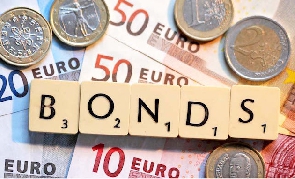To increase investor appetite for Ghana’s planned 2021 Eurobond issuance, the government must signal a strong intention to revive growth and domestic revenue collection, both of which were battered by the COVID-19 shock, Courage Kingsley Martey, senior economist at Databank, has said.
Government is expected to raise up to US$5 billion this year through Eurobonds to support growth-oriented public expenditures.
Currently, according to bond market monitoring platform Cbonds, the yields on Ghana’s outstanding Eurobonds have fallen just below 9 percent from the peak of 14 percent in March 2020.
“One important message is how government intends to revive growth and domestic revenue collection after the COVID-19 shocks, beginning in 2021. Government needs to also emphasise measures it has taken and is implementing to ensure that even though the public debt stock is high, sustainability would not be undermined,” the senior economist said in an interview with Business24.
He noted that these measures need to be clearly stated as a strong selling point to attract investors to the 2021 Eurobond.
“We have seen a gradual tightening of spreads for Ghana’s Eurobonds since June. With the favourable news about COVID-19 vaccine deployment, spreads have tightened further as investors now expect a gradual recovery in global fuel demand as economies reopen around the world.
“This seems to have increased the risk appetite of global bond market investors and is driving demand for Ghana’s outstanding Eurobonds. The prevailing conditions are favourable for Ghana’s planned Eurobond for 2021.”
He added that conditions can further be improved with the 2021 budget if the government signals its intention to compress the budget deficit and reduce the risk to debt sustainability.
Ghana’s total public debt stood at 71 percent of GDP in September 2020. This is slightly higher than the market access threshold of 70 percent.
Interest rates in the US and other advanced economies are set to remain lower for longer than initially expected, whereas the economic backdrop for emerging and frontier markets seems to have improved with the modest recovery in commodity prices.
Business News of Wednesday, 13 January 2021
Source: thebusiness24online.net
Government’s growth, revenue plans seen shaping interest in planned Eurobond
Entertainment












